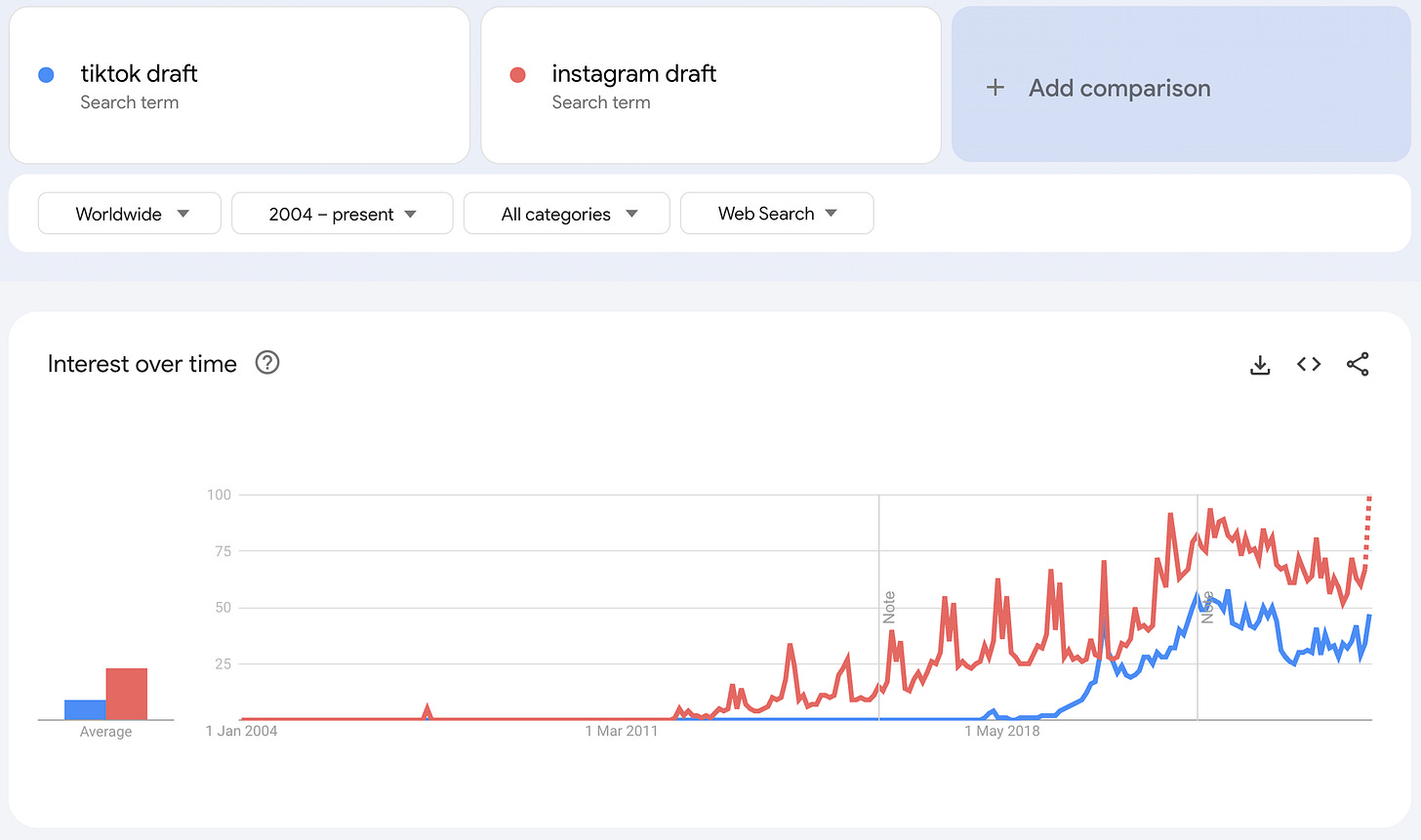Draft Mode on Social Media
We live in draft mode now: always starting, rarely finishing, suspended between intention and action. Are we doomed to live saved in draft?
Tuesday Night on Earth. Letter written on a café terrace, a draft I had started six months ago. Feel free to share this letter.
We are living in an era where everything feels half-finished, half-shared, half-thought.
Hundreds of drafts proliferate across our apps — from grocery lists to fragments of deeper reflections.
Texts are left unsent, articles never truly published.
In a way, we are no longer raising digital cathedrals: we are endlessly digging foundations of data, suspended beginnings that never fully materialize.
 Tiktok failed to load.
Tiktok failed to load.Enable 3rd party cookies or use another browser
Drafts: A Pressure Room for the Digital User?
Google shared a revealing figure: over one billion people use Google Docs every month, creating billions of documents every day.
But how many of these documents are ever finalized, shared, exposed to the world?
Very few, compared to the flood of abandoned beginnings.
Several hypotheses emerge: accumulating drafts gives the illusion of activity, a tangible presence, while avoiding the risk of judgment.
In an era where social media demands performance and aesthetic optimization, drafts have also become private laboratories: repeated attempts at perfect publishing, perfect framing, perfect editing.
On Reddit, the community AppleNotesGang shares the compulsions around this behavior: members discuss how to sort through thousands of notes piling up in their phones.
Interestingly, the more drafts a user accumulates, the slower the Notes app becomes — a physical manifestation of invisible mental overload.
Platforms That Prefer Suspension Over Completion
Most digital platforms encourage us to save, archive, stockpile — but they rarely value the act of finishing.
On Gmail, countless users begin emails with the intention of returning to them “later” — a later that often never comes.
Similarly, on Google Docs, Instagram, TikTok, or Notion, the majority of files remain private, incomplete, and often forgotten.
This isn’t accidental.
In her book The Extended Mind (2021), Annie Murphy Paul shows that externalizing ideas onto digital supports may free up mental space in the short term, but it also weakens our natural drive to bring projects to completion.
The more we outsource beginnings, the less urgency we feel to actually finish them.
At the same time, platform reward mechanisms prioritize visible activity (creating a new file, starting a draft) over the slow, invisible work of completing something meaningful.
As researchers in behavioral economics have observed, digital environments optimize for micro-satisfaction (tiny instant victories) rather than for the sustained effort toward a distant goal.
The result: a multiplication of endless beginnings, open loops, suspended projects.
In a digital environment designed to favor fragmentation, completion becomes almost an act against nature.
Drafts: Therapeutic Space... or Gray Zone?
Yet starting a project without finishing it isn’t always a failure.
Drafts can serve a therapeutic function: initiating a project, even without carrying it to completion, can satisfy a creative impulse, provide a pressure-free space for exploration, or train us to think more freely.
The gesture itself sometimes matters more than the outcome.
On TikTok, many users explain how they use drafts as intimate outbursts — a way to vent frustrations or express tender emotions without the pressure of performance.
A clear echo of ghost posting: a space for creation detached from social validation.
But this dynamic can also generate silent fatigue: an accumulation of unrealized possibilities, a latent weight that gnaws at attention and undermines confidence in our own ability to act.
This risk is heightened by the rise of conversational agents powered by artificial intelligence.
The dialogue between human and machine: is it becoming a kind of comfort food, or could it instead evolve into a demanding journey toward deeper, more authentic creation?
The Zeigarnik Effect: The Tension of the Unfinished
This behavior aligns with a well-documented psychological phenomenon: the Zeigarnik Effect.
First theorized by psychologist Bluma Zeigarnik in the 1920s, it posits that we remember interrupted tasks more vividly than completed ones.
The brain remains tense, unsettled, fixated on what is unfinished, unconsciously seeking closure.
On a digital scale, our thousands of drafts become nodes of captive attention — tiny fault lines draining our mental energy.
In today’s attention economy, a minority dares to publish, to finish, to expose themselves.
The vast majority remains suspended in an in-between state: longing to create, yet unable to escape the draft phase.
We are not lacking in ideas — we are lacking thresholds of completion.
Finalizing has thus become a subversive act: a way of affirming full presence against an abundance of unfulfilled possibilities.
The Trend of the Week: Campus Influencer
The University of North Carolina has decided to encourage 850 of its "student-athletes" to become social media influencers.
Recent NCAA rules now allow college athletes to monetize their name, image, and likeness — not without controversy.
A clear sign of the ongoing fusion between the creator economy and... the world of education.
Amazing links
Bread has become a touristic destination (Atelier Pousse Digest)
A TikTok ‘Fantasy Pope League’ lets you bet on who will become the next pope (Fast Company)
Researchers Secretly Ran a Massive, Unauthorized AI Persuasion Experiment on Reddit Users (404 Media)
Have a great week! This newsletter is written with love, passion, and (French) coffee. Feel free to share this newsletter, like, comment, or keep sending me emails: these notifications are a joy.
My book “Alive In Social Media” is still available on Amazon.








Not me having like 50 substack drafts that are unfinished 🫢